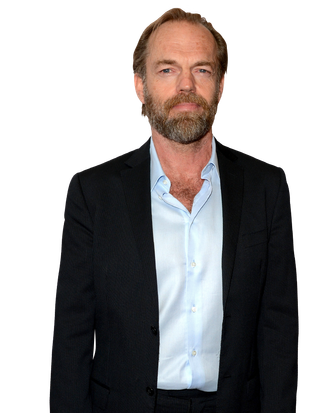
In the Wachowski siblings’ film Cloud Atlas, Hugo Weaving plays multiple characters — a devil, an assassin, a nineteenth-century businessman. But the role that really won over audiences at the Toronto Film Festival was Nurse Noakes, a brutish orderly who menaces the residents of an elderly home. The cross-dressing role gives Weaving a rare opportunity to flaunt his comedy chops, and it’s also his first time donning a fat suit for film. We spoke with Weaving about performing an S&M version of Nurse Ratched, working with Lana Wachowski, and why Cloud Atlas may “be too much” for some people.
Nurse Noakes was a big hit with the audience. Were you padded underneath?
Oh yeah! I had a massive fat suit. And then the whole deal — stockings and high heels, skirt. Then of course all the prosthetics — neck and cheeks and face and chin, and originally nose, but we got rid of that. Lips, I had lips. So it was actually quite extreme. That was the most difficult character to deal with physically. I felt I never quite got to the place I wanted to get to, embodying her physically. I’d like to have had more time with that. Four hours to get into the prosthetics, so you don’t have a lot of time to play around in it. That was something that was difficult for all of us. But the character — I’d always loved her. I loved reading about her in the book, and the script, too.
Were you channeling anyone while playing her?
No, not really. But I had seen Cuckoo’s Nest before, because I thought she was like a sort of S&M version of Nurse Ratched. But she’s also physically quite like a monster.
Have you ever had to wear a fat suit for a role before?
On the stage before, but not on film.
It seems like a fun movie for actors, sort of like being in a theater ensemble.
Very much so. I love that sense of play because as a viewer of the film you’re constantly reminded that these are actors playing roles, because you’re constantly seeing them as someone else. It’s unusual to see that on film. It’s not part of our film language. We try [instead] to create this sort of natural reality, so people can go into this dream world. I think often in film we limit our imaginations a little — well, quite a lot, actually … things get quite formulaic.
The multiple genres in Cloud Atlas make it a hard movie to describe.
It does, and it also makes it a hard movie to accept and to watch, because it’s out of their experience and therefore it’s wrong. So I suspect that will be the main problem for some people: Because it’s unusual, it’s like, “Ehhh that didn’t work for me because I’ve never seen it before and I wanted it to be like this. Why couldn’t they do that?” But what I think is great about it is that it’s actually quite revolutionary in its structure. It’s quite playful yet it’s a very serious film. It manages to incorporate all these elements amazingly well, but I think for some people it will be too much.
When the Wachowskis came to you with the role, did you say yes right away?
We’d all read it, actually, when we did V for Vendetta. So I sort of knew the book very well. And I’ve read all of David Mitchell’s stuff and really love his work. Then I heard they were working on the script, so when Andy rang and said, “There’s a script coming for you and these are the roles we want you to play,” I knew what those roles were. I knew the story and the book. So it was an easy script to read, and a wonderful adaptation of a complex, wonderful novel. I said yes quite quickly.
I just finished The New Yorker article about the Wachowskis and it mentioned how much happier Lana is since she became a woman. Have you noticed that while working with her?
Yeah, I think so. I wouldn’t have said when I first met Larry that he wasn’t content and that he wasn’t talking about the same things that she’s talking about now. But I do know from having talked to her towards the last years of the Matrix, the whole issue started to come up. And then we had a whole conversation about it. I do know it’s been a massive transition for her. Undoubtedly she’s happier now than she was, but you wouldn’t necessarily have known that from the outside.
The Hobbit opens in a few months. Did you have to think twice about playing Elrond again?
No, it seemed to me that’s just what you should do, really. It’s the same people in that world, it’s the same world, the same director. It wouldn’t have seemed right not to do it. Actually I remember in New Zealand, saying to Peter, “Oh well, I guess we’ll see you on The Hobbit.” And he said, “No, no, I’m not doing The Hobbit. We’re not doing The Hobbit.” I said, “Of course you will.” And you know he didn’t want to do it initially — Guillermo Del Toro was directing it. He ended up doing it. It seemed like the right thing to go back and revisit.

